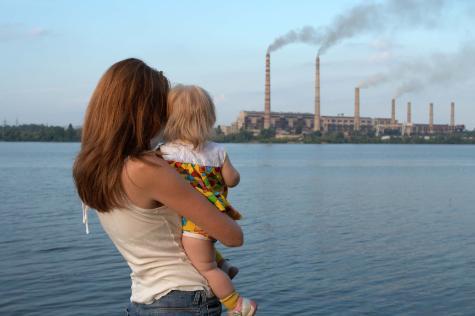Children’s Environmental Health Subject of Summer Program and New Area of Concentration
Children are often more vulnerable to pollutants and other environmental factors that lead to a wide array of common chronic diseases and health issues, including asthma and cancer

Due to differences in behavior and biology, children are often more vulnerable to pollutants and other environmental factors that lead to a wide array of common chronic diseases and other health issues, including asthma and cancer, making it integral that pediatric health care professionals are well prepared to recognize and address environmental aspects to disease. Despite this, “many pediatricians in New York report that they are not comfortable managing environmental aspects of disease and that prior data shows that only 20 percent are even trained to suspect the environment as a cause of disease,” according to Amy Brown, M.D., M.B.E., assistant professor of pediatrics and adjunct associate professor of public health at New York Medical College (NYMC) and a pediatric pulmonologist and children’s environmental health specialist for Boston Children's Health Physicians and Maria Fareri Children’s Hospital at Westchester Medical Center (WMC).
With the goal of providing enhanced foundational support to better address environmental-based exposures for future pediatricians, the School of Medicine (SOM) recently introduced an area of concentration (AOC) in Children’s Environmental Health. The longitudinal educational program, offered on an elective basis, provides SOM students with enriched opportunities in core facets of academic children’s environmental health, including educational experiences, clinical consultation, community advocacy and environmental research.
“Despite children today living longer, healthier lives than in the previous fifty years, they also continue to suffer from a wide array of common chronic diseases, many of which are linked to environmental factors,” says Dr. Brown. “For example, climate change-related disasters lead to short- and long-term environmental exposures, including home damage and uninhabitable living conditions. Climate change increases the incidence of tick- and insect-borne diseases. Warmer temperatures extend pollen production and air pollution. In addition, today’s youth are at risk of exposure to more than 100,000 synthetic chemicals, many of which did not exist just a few decades ago. Diseases caused by toxic chemicals impose great economic burdens with the cost of disease attributable to environmental exposures in New York’s children estimated at $4.35 billion annually.”
The introduction of the new AOC in children’s environmental health grew from the success of a summer training program in pediatric pulmonology, allergy, immunology and sleep medicine, offered in conjunction with the Children's Environmental Health Center of the Hudson Valley, that was inspired by Allen Dozor, M.D., professor of pediatrics and clinical public health at NYMC and chief of pediatric pulmonology, allergy, immunology and sleep medicine at WMC, whose credits his own experience in a summer program to help guide him to achieve great satisfaction and accomplishments in an academic medical career. Over the past 10 years, the program has grown with recruitment of pediatric faculty from the SOM, as well as faculty from NYMC’s School of Health Science and Practice (SHSP), who have worked together to formalize the program and grow enrollment to include high school, undergraduate college and pre-clinical medical students, through a wider range of academic offerings.
One unique aspect of the summer program in 2021 was a blended adjunct offering in coordination with several New York children’s environmental health centers, using the NYSCheck Network, which offered a synchronous self-directed course to more than 40 trainees throughout the state. Students in the NYMC summer program connected with students from across New York to build an educational foundation in Children's Environmental Health and Public Health, as well as actively engage in brainstorming, developing and implementing group-oriented advocacy projects covering a priority topic area in children's environmental health, including climate change and environmental justice, per-and polyfluoroalkyl substance (PFAS) chemicals and safer cleaning and disinfection, which were disseminated in a showcase presentation to the NYS Department of Health.
“The combined student interest and involvement in the priority areas is undoubtedly moving the needle in the field of children's environmental health locally and throughout the state,” said Dr. Brown, who serves as both co-director of the summer program and of the AOC in children’s environmental health, along with Amy Ansehl, D.N.P., R.N., associate dean of SHSP and associate professor of public health. “Our hope is that NYMC students in the program are inspired to serve as mentors to the other students and take on leadership roles in the research projects.”
“Participating in the summer program gave me valuable clinical experience and insight into the lives of pediatric pulmonologists who practice clinical and academic medicine,” said Priyanka Patel, SOM Class of 2024.
“I had such an incredible experience in the summer program,” said Samuel DeSantis, SOM Class of 2022, who participated as a rising second-year medical student in 2019. “The opportunity to gain exposure to clinical research so early in medical school was invaluable. I was also able to rotate through Maria Fareri Children's Hospital with the pediatric pulmonology team, see patients in the outpatient clinic, as well as conduct a quality improvement project aimed at reducing secondhand smoke exposure in children with asthma. I also got the unique opportunity to work with pre-med undergraduate students, gaining early experience in teaching and mentorship as we worked through a retrospective chart review project investigating pulmonary function testing in children with borderline personality disorder and sickle cell anemia.”
Learning about the environmental health effects on children through the program so inspired Mr. DeSantis, that he went on to start the Environmental Health Club at NYMC and become one of the first students to enroll in the new AOC. “My passion for children's health has continued through medical school and I am now applying for pediatric residency programs with plans to continue advocacy work in environmental health in my career as a physician,” said Mr. DeSantis.
